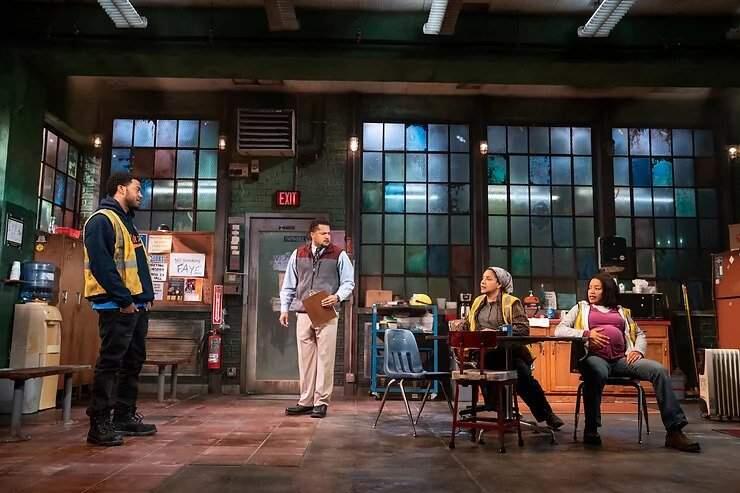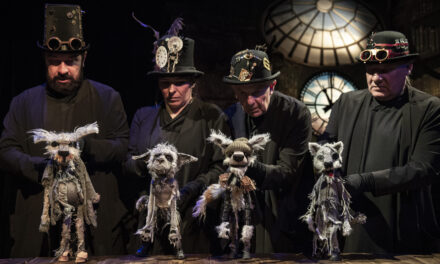Skeleton Crew is Dominique Morisseau’s best play so far. It’s the most streamlined work in her celebrated Detroit trilogy, more tightly plotted, surprising, and moving than either Detroit ’67 (2013) or Paradise Blue (2015), both of which struck me as heartfelt but also faintly explanatory.
Morisseau is a gifted poet of Black vernacular in the vein of August Wilson and also a committed chronicler of modest and marginalized Black American lives whose consequentiality she has a knack for elucidating. Her loving empathy for her conflicted and vulnerable characters is always palpable. I sometimes find that the seams of her research show—particularly in a play like Pipeline (2017) whose story of a Black teenager who assaults a teacher at an elite boarding school was weakened by overt topicality. Skeleton Crew, by contrast, feels purely personal, inspired and propelled by first-hand experience.
I missed this play when it premiered at the Atlantic Theater in 2016. Back then it was overshadowed in the press by Lynn Nottage’s Sweat—a play with very similar subject matter, also by a Black woman, which transferred from the Public Theater to Broadway and won the 2017 Pulitzer Prize. Both plays revolve around an imminent American factory closure during the 2008 financial crisis. Now Skeleton Crew is getting its Broadway premiere, and it’s satisfying to discover that Morriseau’s work deserves the attention just as much.
Skeleton Crew takes place in the grungy breakroom of a Detroit auto plant where four employees gather to eat, change clothes, schmooze and thrash out their reactions to the awful closure news. There’s a plot involving theft of factory materials, one character’s homelessness, and a simmering love affair, all engaging enough, but what really matters in the end is the reveal of each character’s true inner fiber.
All four could easily seem like formulaic types. Faye is the “tough as bricks,” 29-year veteran hoping to reach the 30-year mark to get a big pension bump. Reggie is the shirt-and-tie foreman who came up as a line worker and has close personal ties to Faye not fully explained until late in the play. Shanita is the sassy and visibly pregnant, conscientious model worker whose prophetic dreams about labor pains are a poetic symbol of thwarted potential. And Dez is the slick-talking, gun-packing youngster sweet on Shanita who hopes to work six more months to buy his own garage. Yes, all this may sound typical, but what’s fascinating is that none of it feels that way in performance.
I gave a lot of thought to why. For one thing, Morisseau wrote the roles extraordinarily well, imagining all four so fully that they vibrate with inner life and also speak a consistently beguiling verbal jazz. But for another, this is an extraordinary cast, directed by Ruben Santiago-Hudson (who also directed the Atlantic version with a different cast). Every actor contributes in a different way to the show’s splendid nuance.
Phylicia Rashad is a star known mainly for her dignity and self-possession in dominant leading roles. Remarkably, her performance as Faye is unreservedly humble, gritty, sharp and electric but never exceeding the brassy scrappiness such a grunt worker and aging dyke might exhibit (i.e. to hint at hidden glamour or poise). In fact, the heartsoreness of the performance is so believable that the secret Faye keeps hidden the entire play (I’ll avoid a spoiler here) carries an extra zing of amazement in the end. Everyone—characters and audience—must spend the last scene reflecting back on what we overlooked in her past words and actions.
Brandon J. Dirden is just as clear and precise as Reggie, an ideal part for him. This actor excels in roles—such as Brutus in Julius Caesar and Agent Aderholt in The Americans—where sensitivity and brutality collide in a crisis of self-image. That pretty much sums up Reggie, an earnest and honest foreman used as a cat’s paw by management. Watch the subtle shifts of mood and tactic that Dirden’s Reggie deploys to get through to all the very different employees. Most impressive are the cracks in his proud control that arise with Faye, who accepts his exceptional softness all along but ultimately takes advantage of him.
The one puzzle of the production is its use of supplementary music and dance not called for in the script. The show begins with a slick robot dance by a performer dressed in factory clothes (Adesola Osakalumi), who returns with more bot moves behind the blurry breakroom windows during scene transitions as harsh metal and punk music plays. These transitions are obviously meant to underscore the repetitive, machine-like nature of labor in the plant, as they’re accompanied by projections of moving machinery around the proscenium. Unfortunately, they feel clumsily imported from Expressionist drama—a movement interested mainly in types—and thus clash awkwardly with Skeleton Crew’s intense realism and vitally individual characters.
By Dominique Morisseau
Samuel J. Friedman Theatre
261 W. 47th St.
This article was first published by Theatre Matters on Jan 29, 2022, and has been reposted with permission. To read the original article, click here.
This post was written by the author in their personal capacity.The opinions expressed in this article are the author’s own and do not reflect the view of The Theatre Times, their staff or collaborators.
This post was written by Jonathan Kalb.
The views expressed here belong to the author and do not necessarily reflect our views and opinions.


















